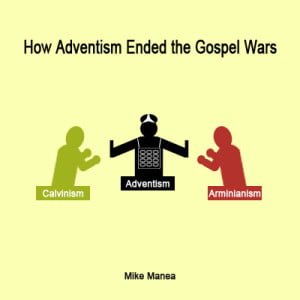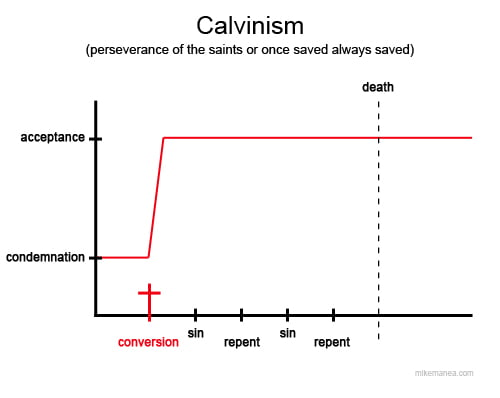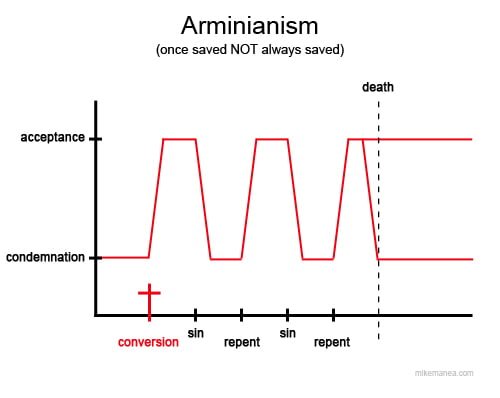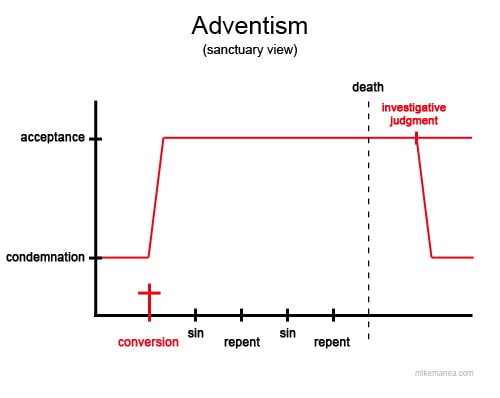How Adventism Ended the Gospel Wars
You might think that, although Christians disagree on a lot of topics, they at least agree on the central theme of their religion: the gospel. But no such luck. You have  Calvinism on the one side, Arminianism on the other, and an entire spectrum of options in between. And that’s just within Protestantism. The Catholic and Orthodox churches as well as the various Christian cults have still other views.
Calvinism on the one side, Arminianism on the other, and an entire spectrum of options in between. And that’s just within Protestantism. The Catholic and Orthodox churches as well as the various Christian cults have still other views.
The Protestant Reformation introduced one important central concept that has stood the test of time as a beacon of hope amidst the doctrinal confusion: Salvation is by grace through faith. Although even this simple statement means different things to different people, all true Protestants acknowledge that when sinners turn to Jesus, they are accepted entirely through Christ’s merits rather than through any merit of their own.
The Salvation Saga of Jimmy and Sam
Consider the following case study as an illustration:
Jimmy grew up in a broken home and got most of his early education on the streets. He started getting into trouble early on and spent much of his teens in and out of juvenile detention. By the time he was a young adult, his conscience was troubled by a long list of cruel and sinful acts that he knew to have been harmful to others and offensive to God.
Sam, on the other hand, was raised by good Christian parents who made sure to “train up a child in the way he should go.” He never got into any kind of trouble growing up. As a young adult, he in all honesty couldn’t remember having ever done anything particularly bad.
Both of these young men happened to be sitting on a plane beside a minister, who began to share the gospel with them. He walked them through the following points:
1. They were sinners.
“For all have sinned, and come short of the glory of God” (Rom. 3:23, KJV).
Now, Jimmy didn’t require too much convincing on this point. He well knew he was a sinner, as did everyone else around him.
Sam, on the other hand, was offended. Why would the minister place him on the same level with a guy who had spent most of his life in jail? Didn’t his exemplary life mean anything to God? What was the point of resisting temptation and staying out of trouble—of not enjoying life like everyone else?
The minister explained to him that there was much value in the wholesome life he had lived up to that point. But, making reference to God’s law and to the fulfillment of this law in the life of Jesus Christ, he helped Sam more fully understand God’s ideal for his life. Even though he had not done many of the things Jimmy had done, he nonetheless had taken his privileged life for granted, had not shared his blessings with others in need, and had even despised people like Jimmy who were less fortunate. In this Sam had fallen far short of the ideal God had for him.
2. They could not change themselves.
“But we are all as an unclean thing, and all our righteousnesses are as filthy rags” (Isa. 64:6).
Having understood their condition as sinners and the implications for their eternal destiny, both young men determined to make a reformation in their lives—to change those things that were against the will of God. The minister, however, explained that even this would not be good enough. God is interested in more than just the external actions; He is interested in service stemming from the heart.
“Either make the tree good, and his fruit good; or else make the tree corrupt, and his fruit corrupt: for the tree is known by his fruit.… For out of the abundance of the heart the mouth speaketh” (Matt. 12:33, 34).
He used an illustration to bring the point home:
“A serial child molester was finally caught and imprisoned. After several years it came to his attention that, because of budget cuts, certain inmates of exemplary behavior would have the opportunity to be released on parole. From that time on this man became the nicest, kindest inmate in that prison. And, sure enough, when the time came for the hearing, he was released for good behavior.”
The minister then asked, “Would you be comfortable allowing this man to babysit your children?”
It is very much possible, he explained, for us to change our behavior without ever changing who we really are. But even though we might understand our own sinfulness and make efforts to change on the inside, our motivations for this would still proceed from a desire for gain or self-preservation. To be genuine, the change would need to come from a pure heart, and changing our own hearts is like trying to pick ourselves up by our own bootstraps.
“The heart is deceitful above all things, and desperately wicked: who can know it?” (Jer. 17:9).
“Who can bring a clean thing out of an unclean? not one” (Job 14:4).
Recognizing the dilemma, both Jimmy and Sam began to wonder if there was any hope for them to be saved.
“O wretched man that I am! who shall deliver me from the body of this death?” (Rom. 7:24).
3. They could be saved only by grace through faith.
Sensing that the young men were finally ready, the minister explained that it was because of this very inability to save themselves that God was offering them salvation as a gift.
“For by grace are ye saved through faith; and that not of yourselves: it is the gift of God: Not of works, lest any man should boast” (Eph. 2:8, 9).
Sam and Jimmy discovered that God wasn’t waiting for them to become better persons before accepting them but was offering them forgiveness and acceptance then and there if they were willing to embrace it by faith. He was more than willing to accept them as His own like the father in the story of the prodigal son.
“But when the fulness of the time was come, God sent forth his Son, made of a woman, made under the law, to redeem them that were under the law, that we might receive the adoption of sons. And because ye are sons, God hath sent forth the Spirit of his Son into your hearts, crying, Abba, Father. Wherefore thou art no more a servant, but a son; and if a son, then an heir of God through Christ” (Gal. 4:4-7).
Having understood their own condition and desperate need, Jimmy and Sam were now being offered salvation as a gift. Were they willing to receive this gift? Did they want the pardon and acceptance of God? If so, would they take God at His word and believe that God did in fact accept and forgive them then and there?
The Kernel of the Gospel
You might wonder why I have spent considerable time on something so basic. But recognize that while Protestants disagree on many things when it comes to the gospel, they do hold these three elements in common:
- We are sinners.
- We cannot change ourselves.
- Salvation is offered to us as a gift that we accept by faith.
I call this the kernel of the gospel because, while there are many other important elements, these three concepts are the bare minimum that a person must understand to be saved. Without these elements, understanding everything else is not enough. (Take a look at a paper Martin Luther wrote just five years after the 95 Theses to see how well these points were understood so early in the Reformation.)
It is an experiential understanding of these three concepts that makes the new birth possible, that restores the severed bond between the individual and the Holy Spirit. When this bond is restored, God can work in a person’s life in ways He could never do before, even if their theology might still be off in some respects.
To say it differently, it is only after the sinner grasps by faith the promise of God’s forgiveness and acceptance, only after he experiences the peace and security of being reconciled with God, that the power of Christianity kicks in, and the life is transformed as well.
Therefore, as you interact with other people who hold a different view of the gospel than yourself, consider the following:
- Whatever the theological disagreement, if they grasp this kernel of the gospel, you are speaking with someone who is more deeply linked with you through the bond of the Spirit than even your earthly relatives. Discuss accordingly.
- A person who agrees with you theologically but lacks the actual experience has less in common with you than someone who has the experience but differs theologically.
- If it is evident that someone who disagrees with you theologically also lacks an experiential knowledge of the gospel, you can use their own theological tradition (assuming they are Protestant) to bring them to Christ first before attempting to correct their theology as well.
- If the person you disagree with grasps the essence of the gospel and also happens to be a conservative Adventist (which I define as someone who agrees with all 28 of the church’s fundamental beliefs, including the inspiration of Ellen White), the nature of your disagreement is in most cases of such a nature that it should not prevent you from pressing forward in unity.
The Gospel Wars: Assurance vs. Presumption
With that in mind, let’s take a look at the conflicts over the gospel within Protestantism and at how Adventism provided a resolution.
Less than a century after the death of Luther, Protestantism was polarizing into Calvinism and Arminianism. The difference revolved around the question of whether the individual possessed a free will. Calvinism’s position was summarized in five points, known by the acronym TULIP: Total depravity, Unconditional election, Limited atonement, Irresistible grace, and the Perseverance of the saints. Arminianism rejected each of these points at least in part. (Take a look at this table for a more detailed explanation of the two contrasting views.)
Today, while we still find denominations representing each of these two views, we also find groups that borrow from both. For example, some groups might reject the first few points of Calvinism but accept the last one, thus believing only the doctrine of “once saved, always saved.”
It is beyond the scope of this article to give a detailed account of the theology and history of Calvinism, Arminianism, and the in-between traditions. Instead, let’s return to the kernel of the gospel as described above—the part of the gospel that all true Protestants agree on—and take a look at how each of these traditions proceed from there.
Jimmy and Sam: What Happens Next?
Let’s imagine that our friends Jimmy and Sam above both accepted the minister’s invitation, repented, surrendered, and believed the gospel. In their newfound faith their lives were completely changed. Jimmy was unrecognizable, while Sam now found the service of God a joy rather than a duty. Sins and habits they had failed repeatedly to overcome were now easily cast off and forgotten. For weeks and months they continued on in this new experience. Had this been a fairytale, they might have lived like this “happily ever after.”
But instead, it happened. Sometime down the line, during a moment of weakness, a temptation from the past found its way back into their life, and they fell. Some sin they didn’t think they would ever commit again overtook them, and now they were left to wonder if it was all over, if their newfound walk with God had come to an end.
The differing views within Protestantism revolve not around how a person is initially saved but around what happens to them afterward.
I would propose that, at least in part, the reasoning that eventually led to Calvinism stemmed from the practical experience of wrestling with sin and doubt as an already born-again Christian. It unfolded as follows:
- It was not by our own works that we were initially saved, and it was not until we first gained the full assurance of God’s acceptance that we were able to live a victorious Christian life.
- Because we still have a sinful flesh, we are prone to fall again.
- When such failures happen, unless we retain that assurance of God’s full acceptance, we will lose the source of our strength, and this will lead us deeper into sin rather than back to God. Therefore, no matter what happens, we must continue to believe that our salvation is secure.
Arminians, on the other hand, felt that this reasoning could lead to presumption; that people would come to excuse sin, thinking they would be saved regardless.
And, in a sense, both camps were right. Each group, while attempting to avoid one ditch, ran the risk of falling into the other.
While trying to protect themselves from a false sense of security, Arminians wrestled with their standing before God. When failure came, they wondered if God was still extending mercy to them or if they had gone too far and were now under condemnation. And this sense of uncertainty regarding God’s favor did make sin that much more difficult to resist.
Calvinists, on the other hand, did not have this problem, but they were more likely to take God’s grace for granted and to overlook sin.
The Sanctuary Solves the Conflict
In the midst of this confusion about the gospel, Adventism came on the scene. Although Adventism was very much Arminian in its DNA, it did provide a new framework that made it possible to take the positives from Calvinism without the negatives, while retaining only the positives from Arminianism. That framework was found in our sanctuary doctrine.
In our study of the heavenly sanctuary we came to understand that Jesus holds two distinct offices, that of Mediator and that of Judge. We also realize that these two offices are separated in time and do not overlap. Yes, a person who had experienced a true conversion could still be lost in the end. But this was not something that heaven would look into until their case came up in the investigative judgment after their death. For as long as the person was alive, Jesus would relate to them as a Savior, extending them unlimited grace and mercy without judgment or condemnation.
If it is not yet clear how this makes a difference, consider that under the Adventist view a person could have as much assurance of their acceptance with God as any Calvinist ever could, but without the presumption. Knowing that one’s case will eventually be judged prevents a person from taking sin or grace for granted. But knowing that this judgment will not take place until after death and that while the individual is still alive Jesus’ only focus is on saving makes it possible to come boldly to the throne of grace no matter what the sin or how great the fall.
Take a look at the following graphics illustrating the various theological perspectives:

While they can derive great benefit from an assurance of God’s acceptance, Calvinists’ theology puts them at risk of discovering only in the judgment (too late) that they are lost.

While Arminians’ theology does not allow them that false sense of security, the constant roller-coaster ride often makes for a miserable Christian experience, while the unnecessary sense of condemnation makes sin harder to resist.

The sanctuary doctrine makes it possible to have full assurance of God’s acceptance without taking our salvation for granted. The key element to remember here is that anytime we doubt God’s approval of us because of sin, we are prone to commit more sin.
Our view of the Great Controversy helps us to understand that God has to balance several factors:
- He loves all sinners and wants to do everything possible to save them while He still can.
- He loves the redeemed (those who will spend eternity with Him) and wants to protect them from the possibility of anyone starting another rebellion after the Second Coming.
- He has the utmost respect for each individual’s freedom of choice.
The way God is balancing these three elements is by showering every grace imaginable on each person while they are alive, no matter what they do or how many times they take His grace for granted. Once they have died and there is nothing more that can be done to save them, God examines their life to determine if they are safe to have among the redeemed.
Now this is not to imply that God might not at times choose to discipline us if that is what is needed to save us. But everything God does is for the purpose of saving us and not in condemnation or as punishment. Also, there definitely is power in the gospel to overcome our sins. But this power comes only as we grasp by faith the reality of God’s acceptance.
Some might wonder how this applies to those who are still alive at Christ’s coming, since for them the investigation cannot take place after their death. While this is a question that would require an entire article to address, we can be sure for now that in dealing with this group of people, God will continue to do everything in His power to save them while protecting the welfare of the redeemed as well. Having witnessed the grace of God toward His people thus far, we can be sure that He will not put anyone at a disadvantage in the future. (See this article regarding the judgment of the living)
The Sanctuary: A Cult Doctrine?
I want to briefly explain how to respond to the accusations of those either inside (ex. Desmond Ford) or outside the church who feel the sanctuary doctrine makes us a cult:
- Ask if they are Calvinist or if they believe in “once saved, always saved.”
- If so, ask if they consider all Arminians a cult (keep in mind that informed Calvinists are careful not to label mainstream Arminians as a cult). If they do, tell them their problem is not with Adventists but with Arminians in general.
- If they don’t consider other Arminian groups a cult, then the burden is on them to prove that our brand of Arminianism is different enough to make us a cult. (All Arminians believe in some form of investigative judgment, since a person who was once saved could still be lost).
- Using my explanation of the sanctuary above, show that our version of Arminianism is the closest to Calvinism, and therefore, if they consider us a cult, they must consider all Arminians a cult.
(For more on this see the article called ‘Why the Investigative Judgment Doctrine is Sound‘)
Why Adventists Still Fight About the Gospel
In closing, notice that I named this article “How AdventISM [not AdventISTS] Ended the Gospel Wars.” This is because, unfortunately, while our church was given the theological framework to help put an end to the centuries-old conflict between Calvinism and Arminianism, we not only have failed in doing this but have allowed similar conflicts over the gospel within our own denomination. We argue about whether the emphasis should be on justification or on sanctification, whether to emphasize the assurance of salvation or to stress that people should “take heed lest [they] fall,” when, all along, God has given us the sanctuary doctrine as a framework to bring all these elements into their proper balance. More than this, because we have a much bigger list of “dos and don’ts” than most Arminian Christians, we experience an even more traumatic roller-coaster ride in our Christian walk and inevitably end up a discouraged and generally unhappy group of people.
My hope, however, is that we will learn from the sanctuary doctrine a balanced view of the gospel that will help us in our own personal experience and resolve the disagreements amongst our own people, as well as bridge the divide within Protestantism as a whole.

